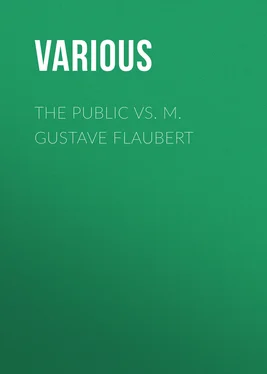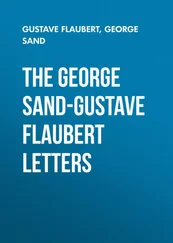Various - The Public vs. M. Gustave Flaubert
Здесь есть возможность читать онлайн «Various - The Public vs. M. Gustave Flaubert» — ознакомительный отрывок электронной книги совершенно бесплатно, а после прочтения отрывка купить полную версию. В некоторых случаях можно слушать аудио, скачать через торрент в формате fb2 и присутствует краткое содержание. Жанр: foreign_antique, periodic, foreign_edu, на английском языке. Описание произведения, (предисловие) а так же отзывы посетителей доступны на портале библиотеки ЛибКат.
- Название:The Public vs. M. Gustave Flaubert
- Автор:
- Жанр:
- Год:неизвестен
- ISBN:нет данных
- Рейтинг книги:5 / 5. Голосов: 1
-
Избранное:Добавить в избранное
- Отзывы:
-
Ваша оценка:
- 100
- 1
- 2
- 3
- 4
- 5
The Public vs. M. Gustave Flaubert: краткое содержание, описание и аннотация
Предлагаем к чтению аннотацию, описание, краткое содержание или предисловие (зависит от того, что написал сам автор книги «The Public vs. M. Gustave Flaubert»). Если вы не нашли необходимую информацию о книге — напишите в комментариях, мы постараемся отыскать её.
The Public vs. M. Gustave Flaubert — читать онлайн ознакомительный отрывок
Ниже представлен текст книги, разбитый по страницам. Система сохранения места последней прочитанной страницы, позволяет с удобством читать онлайн бесплатно книгу «The Public vs. M. Gustave Flaubert», без необходимости каждый раз заново искать на чём Вы остановились. Поставьте закладку, и сможете в любой момент перейти на страницу, на которой закончили чтение.
Интервал:
Закладка:
Various
The Public vs. M. Gustave Flaubert
The folios referred to in the trial are the folios either of the Revue de Paris or of the first edition of the book.—EDITOR.
Speech of the Prosecuting Attorney ,
M. ERNEST PINARD
Gentlemen, in entering upon this debate, the Public Attorney is in the presence of a difficulty which he cannot ignore. It cannot be put even in the nature of a condemnation, since offenses to public morals and to religion are somewhat vague and elastic expressions which it would be necessary to define precisely. Nevertheless, when we speak to right-minded, practical men we are sure of being sufficiently understood to distinguish whether a certain page of a book carries an attack against religion and morals or not. The difficulty is not in arousing a prejudice, it is far more in explaining the work of which you are to judge. It deals entirely with romance. If it were a newspaper article which we were bringing before you, it could be seen at once where the fault began and where it ended; it would simply be read by the ministry and submitted to you for judgment. Here we are not concerned with a newspaper article, but entirely with a romance, which begins the first of October, finishes the fifteenth of December, and is composed of six numbers, in the Revue de Paris , 1856. What is to be done in such a case? What is the duty of the Public Ministry? To read the whole romance? That is impossible. On the other hand, to read only the incriminating texts would expose us to deep reproach. They could say to us: If you do not show the case in all its parts, if you pass over that which precedes and that which follows the incriminating passages, it is evident that you wish to suppress the debate by restricting the ground of discussion. In order to avoid this twofold difficulty, there is but one course to follow, and that is, to relate to you the whole story of the romance without reading any of it, or pointing out any incriminating passage; then to cite incriminating texts, and finally to answer the objections that may arise against the general method of indictment.
What is the title of the romance? Madame Bovary . This title in itself explains nothing. There is a second in parentheses: Provincial Morals and Customs . This is also a title which does not explain the thought of the author but which gives some intimation of it. The author does not endeavour to follow such or such a system of philosophy, true or false; he endeavours to produce certain pictures, and you shall see what kind of pictures! Without doubt, it is the husband who begins and who terminates the book; but the most serious portrait of the work, the one that illumines the other paintings, is that of Madame Bovary.
Here I relate, I do not cite. It takes the husband first at college, and it must be stated that the boy already gave evidence of the kind of husband he would make. He is excessively heavy and timid, so timid that when he arrives at the college and is asked his name, he responds: " Charbovari " He is so dull that he works continually without advancing. He is never the first, nor is he the last in his class; he is the type, if not of the cipher at least of the laughing-stock of the college. After finishing his studies here, he goes to study medicine at Rouen, in a fourth-story room overlooking the Seine, which his mother rented for him, in the house of a dyer of her acquaintance. Here he studies his medical books, and arrives little by little, not at the degree of doctor of medicine, but that of health officer. He frequented the inns, failed in his studies, but as for the rest, he had no other passion than that of playing dominoes. This is M. Bovary.
The time comes for him to marry. His mother finds him a wife in the widow of a sheriff's officer of Dieppe; she is virtuous and plain, is forty-five years old, and has six thousand a year income. Only, the lawyer who had her capital to invest set out one fine morning for America, and the younger Madame Bovary was so much affected, so struck down by this unexpected blow that she died of it. Here we have the first marriage and the first scene.
M. Bovary, now being a widower, begins to think of marrying again. He questions his memory; there is no need of going far; there immediately comes to his mind the daughter of a neighboring farmer, Mile. Emma Rouault, who had strangely aroused Madame Bovary's suspicions. Farmer Rouault had but one daughter, and she had been brought up by the Ursuline sisters at Rouen. She was little interested in matters of the farm; her father was anxious for her to marry. The health officer presented himself, there was no difficulty about the dot , and you understand that with such a disposition on both sides, these things are quickly settled. The marriage takes place. M. Bovary is at his wife's knees, is the happiest of men and the blindest of husbands. His sole occupation is anticipating his wife's wishes.
Here the rôle of M. Bovary ends; that of Madame Bovary becomes the serious work of the book.
Gentlemen, does Madame Bovary love her husband, or try to love him? No; and from the beginning there has been what we might call the scene of initiation. From the moment of her marriage, another horizon stretched itself out before her, a new life appeared to her. The proprietor of Vaubyessard Castle gave a grand entertainment. He invited the health officer and his wife, and this was for her an initiation into all the ardour of voluptuousness! There she discovered the Duke of Laverdière who had had some success at Court; she waltzed with a viscount and experienced an unusual disturbance of mind. From this moment she lived a new life; her husband and all her surroundings became insupportable to her. One day, in looking over some furniture, she hit a piece of wire which tore her finger; it was the wire from her wedding bouquet.
To try to dispel the ennui that was consuming her, M. Bovary sacrificed his office and established himself at Yonville. Here was the scene of the first fall. We are now in the second number. Madame arrived at Yonville, and there, the first person she met upon whom she could fix her attention was—not the notary of the place, but the only clerk of that notary, Léon Dupuis. This is a young man who is making his own way and is about to set out for the capital. Any other than M. Bovary would have been disquieted by the visits of the young clerk, but M. Bovary is so ingenuous that he believes in his wife's virtue. Léon, wholly inexperienced, has the same idea. He goes away, and the occasion is lost; but occasions are easily found again.
There was in the neighborhood of Yonville one Rodolphe Boulanger (you understand that I am narrating). He was a man of thirty-four years old and of a brutal temperament; he had had much success and many easy conquests; he then had an actress for a mistress. He saw Madame Bovary; she was young and charming; he resolved to make her his mistress. The thing was easy; three meetings were sufficient to bring it about. The first time he came to an agricultural meeting, the second time he paid her a visit, the third time he accompanied her on a horseback ride which her husband judged necessary to her health; it was then, in a first visit to the forest, that the fall took place. Their meetings multiplied after this, at Rodolphe's chateau and in the health officer's garden. The lovers reached the extreme limits of voluptuousness! Madame Bovary wished to elope with Rodolphe, but while Rodolphe dared not say no, he wrote a letter in which he tried to show her that for many reasons, he could not elope. Stricken down by the reception of this letter, Madame Bovary had a brain fever, following which typhoid fever declared itself. The fever killed the love, but the malady remained. This is the second scene.
Читать дальшеИнтервал:
Закладка:
Похожие книги на «The Public vs. M. Gustave Flaubert»
Представляем Вашему вниманию похожие книги на «The Public vs. M. Gustave Flaubert» списком для выбора. Мы отобрали схожую по названию и смыслу литературу в надежде предоставить читателям больше вариантов отыскать новые, интересные, ещё непрочитанные произведения.
Обсуждение, отзывы о книге «The Public vs. M. Gustave Flaubert» и просто собственные мнения читателей. Оставьте ваши комментарии, напишите, что Вы думаете о произведении, его смысле или главных героях. Укажите что конкретно понравилось, а что нет, и почему Вы так считаете.












